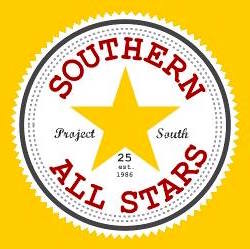Founded in 1986, Project South has developed thousands of leaders within communities directly affected by racism and economic injustice in order to build social movements to eliminate poverty.
For over 25 years, we have used popular education techniques as an organizing tool to build a base of skilled leadership that directly challenges racism and poverty at the roots.
Project South builds communications capacities among low-income families of color and provides multiple mechanisms to shift public dialogue on local, regional, and national levels. Coupled with long-term leadership development programs, our people-centered communication tools, including our organizational newsletter, a bimonthly youth-led radio show, and our monthly membership sessions and debate society increase public education through civic engagement. The Project South newsletter As the South Goes reaches 3,000 members and contacts twice a year with education, updates, and consciousness-raising political analysis on poverty, race, global struggles, and youth realities.
Project South has evolved to generate significant social movement infrastructure in the US South and has continued to produce accessible and collectively developed educational resources. For the past ten years, Project South has been at the forefront of popular education curriculum publications throughout the South and nationally. We have published two workbooks and eight toolkits that include analysis, history, and popular education workshop activities on a wide range of social justice topics from healthcare to the globalization. We have sold over 5,000 publications, and donated countless more, that are used in classrooms and by community organizations and programs across the country. In the past five years, we have created three toolkits: Today’s Globalization, Black Radical Traditions in the US South, and The Critical Classroom. We have sold over 1,500 of these toolkits about the issues of poverty and our collective work to fight for justice.
Through our Building A Movement (BAM) curriculum, Project South provides ongoing political education and long-term strategy development for grassroots organizing that has reached over 700 leaders throughout the U.S South, Gulf Coast, and Southwest over the past 5 years. Since 2003, we have facilitated over twenty (20) 2-3 day retreats for frontline community organizers, and in 2004 held a 4-day movement vision session called the Midnite School for over 60 organizers across the country. In 2006, we launched the first BAM Institute for a cohort of Gulf Coast leaders to engage in an eight-month leadership process to develop innovative strategies to confront the regional crisis. We are currently facilitating our fifth BAM Institute cycle. BAM Institute graduates and current participants are key leaders in over 20 social justice organizations across the Southeast region.
Over the last five years, Project South facilitated the integration of 250 young people into community organizing and social movement efforts to lift themselves and their communities out of poverty. 100% of our youth participants come from low-income, Black communities that have faced persistent poverty in Atlanta for decades. Project South is entering our fourth school-year of the Youth Community Action Program, where youth and adult staff facilitate political education and life skills training classes 3 days a week after school. Since January 2008, Project South youth leaders have planned, produced and broadcasted 104 half-hour youth-led public affairs radio broadcasts. 2015 marks the 8th anniversary of our annual month-long political education and community organizing summer institute, facilitated by four youth and two adult staff called the Septima Clark Community Power Institute.
Over the past three years, Project South has played the role of organizational co-facilitator of an emerging regional and national community governance and organizing methodology called the People’s Movement Assembly (PMA). Since 2007 there have been 200 PMAs held throughout the country. Each PMA brings together the maximum possible number of people working on a specific issue related to low-income communities and facilitates the group through a process to develop historical analysis of the problem, to seek strategic interventions, and to commit to action steps. Along with a national PMA that brought together 3,000 people in Detroit, Michigan at the most recent US Social Forum, the PMA process has engaged over 12,000 people across the country.
